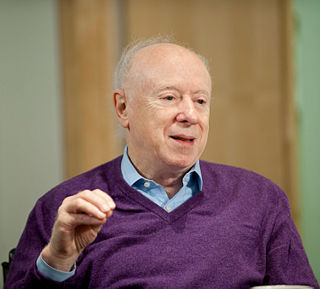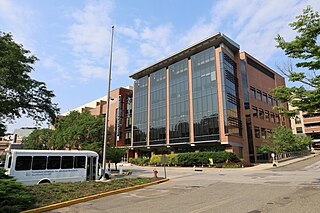Related Research Articles

The Rockefeller University is a private biomedical research and graduate-only university in New York City, New York. It focuses primarily on the biological and medical sciences and provides doctoral and postdoctoral education. It is classified among "R2: Doctoral Universities – High research activity." Rockefeller is the oldest biomedical research institute in the United States.
Ronald Mark Evans is an American Biologist, Professor and Head of the Salk’s Gene Expression Laboratory, and the March of Dimes Chair in Molecular and Developmental Biology at the Salk Institute for Biological Studies in La Jolla, California and a Howard Hughes Medical Institute Investigator. Dr. Ronald M. Evans is known for his original discoveries of nuclear hormone receptors (NR), a special class of transcriptional factor, and the elucidation of their universal mechanism of action, a process that governs how lipophilic hormones and drugs regulate virtually every developmental and metabolic pathway in animals and humans. Nowadays, NRs are among the most widely investigated group of pharmaceutical targets in the world, already yielding benefits in drug discovery for cancer, muscular dystrophies, osteoporosis, type II diabetes, obesity, and cardiovascular diseases. His current research focuses on the function of nuclear hormone signaling and their function in metabolism and cancer.

Joseph Leonard Goldstein ForMemRS is an American biochemist. He received the Nobel Prize in Physiology or Medicine in 1985, along with fellow University of Texas Southwestern researcher, Michael Brown, for their studies regarding cholesterol. They discovered that human cells have low-density lipoprotein (LDL) receptors that remove cholesterol from the blood and that when LDL receptors are not present in sufficient numbers, individuals develop hypercholesterolemia and become at risk for cholesterol related diseases, notably coronary heart disease. Their studies led to the development of statin drugs.

University of Erlangen–Nuremberg is a public research university in the cities of Erlangen and Nuremberg in Bavaria, Germany. The name Friedrich–Alexander comes from the university's first founder Friedrich, Margrave of Brandenburg-Bayreuth, and its benefactor Alexander, Margrave of Brandenburg-Ansbach.
Philip Leder was an American geneticist.

The Gottfried Wilhelm Leibniz Prize, or Leibniz Prize, is awarded by the German Research Foundation to "exceptional scientists and academics for their outstanding achievements in the field of research". Since 1986, up to ten prizes have been awarded annually to individuals or research groups working at a research institution in Germany or at a German research institution abroad. It is considered the most important research award in Germany.

Charles David Allis was an American molecular biologist, and the Joy and Jack Fishman Professor at the Rockefeller University. He was also the Head of the Laboratory of Chromatin Biology and Epigenetics, and a professor at the Tri-Institutional MD–PhD Program.

James Edwin Darnell Jr. is an American biologist who made significant contributions to RNA processing and cytokine signaling and is author of the cell biology textbook Molecular Cell Biology.

Jeffrey M. Friedman is a molecular geneticist at New York City's Rockefeller University and an Investigator of the Howard Hughes Medical Institute. His discovery of the hormone leptin and its role in regulating body weight has had a major role in the area of human obesity. Friedman is a physician scientist studying the genetic mechanisms that regulate body weight. His research on various aspects of obesity received national attention in late 1994, when it was announced that he and his colleagues had isolated the mouse ob gene and its human homologue. They subsequently found that injections of the encoded protein, leptin, decreases body weight of mice by reducing food intake and increasing energy expenditure. Current research is aimed at understanding the genetic basis of obesity in human and the mechanisms by which leptin transmits its weight-reducing signal.

North Shore University Hospital is a part of Northwell Health, New York State's largest healthcare provider and private employer. It is a primary teaching hospital for the Zucker School of Medicine, offering residency programs, postgraduate training programs and clinical fellowships. It is located in Manhasset, New York.
The Gruber Prize in Neuroscience, established in 2004, is one of three international awards worth US$500,000 made by the Gruber Foundation, a non-profit organization based in Yale University in New Haven, Connecticut.

Ralph Marvin Steinman was a Canadian physician and medical researcher at Rockefeller University, who in 1973 discovered and named dendritic cells while working as a postdoctoral fellow in the laboratory of Zanvil A. Cohn, also at Rockefeller University. Steinman was one of the recipients of the 2011 Nobel Prize in Physiology or Medicine.

The Feinstein Institutes for Medical Research in Manhasset, Nassau County, New York, United States, on Long Island, constitute the research arm of Northwell Health. Feinstein is home to 50 research labs, 2,500 clinical research studies, and 5,000 professional and support staff. Feinstein scientists conduct research in molecular medicine, genetics, cancer, brain research, mental health, autoimmunity and bioelectronic medicine, among others. Feinstein is the laboratory and faculty home of the Elmezzi Graduate School of Molecular Medicine. Students without an MD degree may earn a PhD in molecular medicine via the Zucker School of Medicine, as part of the medical school's MD/PhD or PhD programs.

Peter K. Gregersen is a geneticist who heads the Robert S. Boas Center for Genomics and Human Genetics at Northwell's Feinstein Institute for Medical Research in Manhasset, New York, and is a professor of molecular medicine at Hofstra Northwell School of Medicine. He received his MD from Columbia University in 1976.
Betty Diamond is an American physician and researcher. She is director of the Institute of Molecular Medicine at Northwell Health's Feinstein Institute for Medical Research in Manhasset, NY. She was elected a member of the National Academy of Sciences in 2022.
The Wiley Prize in Biomedical Sciences is intended to recognize breakthrough research in pure or applied life science research that is distinguished by its excellence, originality and impact on our understanding of biological systems and processes. The award may recognize a specific contribution or series of contributions that demonstrate the nominee's significant leadership in the development of research concepts or their clinical application. Particular emphasis will be placed on research that champions novel approaches and challenges accepted thinking in the biomedical sciences.

Huda Yahya Zoghbi, born Huda El-Hibri, is a Lebanese-born American geneticist, and a professor at the Departments of Molecular and Human Genetics, Neuroscience and Neurology at the Baylor College of Medicine. She is the director of the Jan and Dan Duncan Neurological Research Institute. She became the editor of the Annual Review of Neuroscience as of 2018.

Lynne Elizabeth Maquat is an American biochemist and molecular biologist whose research focuses on the cellular mechanisms of human disease. She is an elected member of the American Academy of Arts and Sciences, the National Academy of Sciences and the National Academy of Medicine. She currently holds the J. Lowell Orbison Endowed Chair and is a professor of biochemistry and biophysics, pediatrics and of oncology at the University of Rochester Medical Center. Professor Maquat is also Founding Director of the Center for RNA Biology and Founding Chair of Graduate Women in Science at the University of Rochester.

Emmanuelle Marie Charpentier is a French professor and researcher in microbiology, genetics, and biochemistry. As of 2015, she has been a director at the Max Planck Institute for Infection Biology in Berlin. In 2018, she founded an independent research institute, the Max Planck Unit for the Science of Pathogens. In 2020, Charpentier and American biochemist Jennifer Doudna of the University of California, Berkeley, were awarded the Nobel Prize in Chemistry "for the development of a method for genome editing". This was the first science Nobel Prize ever won by two women only.

Michel C. Nussenzweig is a professor and head of the Laboratory of Molecular Immunology at The Rockefeller University and a Howard Hughes Medical Institute investigator. He is a member of both the US National Academy of Medicine and the US National Academy of Sciences.
References
- ↑ "WEDDING; Wendy Joseph, Jeffrey Ravetch". The New York Times. October 28, 2001 – via NYTimes.com.
- ↑ "The Rockefeller University » Scientists & Research". rockefeller.edu. Archived from the original on February 19, 2015. Retrieved February 12, 2015.
- ↑ Ravetch J (May 2009). "Profile of Jeffrey Ravetch". Proc. Natl. Acad. Sci. U.S.A. 106 (19): 7689–91. Bibcode:2009PNAS..106.7689D. doi: 10.1073/pnas.0903830106 . PMC 2683121 . PMID 19416845.
- ↑ "BioTechniques – Profile of Jeffrey V. Ravetch, M.D., Ph.D." biotechniques.com. Retrieved February 12, 2015.
- ↑ "Stocks". Bloomberg.com. July 17, 2023.
- ↑ "CRI Profile".
- ↑ "The Rockefeller University » Hospital Centennial". centennial.rucares.org.
- ↑ "Jeffrey V. Ravetch – Gairdner". gairdner.org. Archived from the original on September 4, 2016. Retrieved February 12, 2015.
- ↑ "Report on Gairdner Award". Archived from the original on March 15, 2015. Retrieved February 12, 2015.
- ↑ "ASBMB Article on Gairdner".
- ↑ "Sanofi Prize".
- ↑ "Honorary doctorates › Friedrich-Alexander-Universität Erlangen-Nürnberg". Friedrich-Alexander-Universität Erlangen-Nürnberg. July 17, 2023. Retrieved July 17, 2023.
- ↑ Simply-Smart. "פרופ' ג'פרי ראבץ', Jeffrey Ravetch". 115.173. Retrieved February 12, 2015.
- ↑ "Report on Wolf Prize". Archived from the original on February 6, 2015. Retrieved February 12, 2015.
- ↑ "Wolf Prizes in the sciences and arts presented to nine North Americans". The Jerusalem Post | JPost.com.
- ↑ "Feinstein Institutes for Medical Research | Northwell Health". feinstein.northwell.edu.
- ↑ "Robert Koch Stiftung – Robert Koch Award". www.robert-koch-stiftung.de.
- ↑ "Jeffrey Ravetch". National Academy of Sciences. June 10, 2021. Retrieved July 17, 2023.
- ↑ "Jeffrey Ravetch elected to Institute of Medicine". Rockefeller. October 8, 2007. Retrieved July 17, 2023.